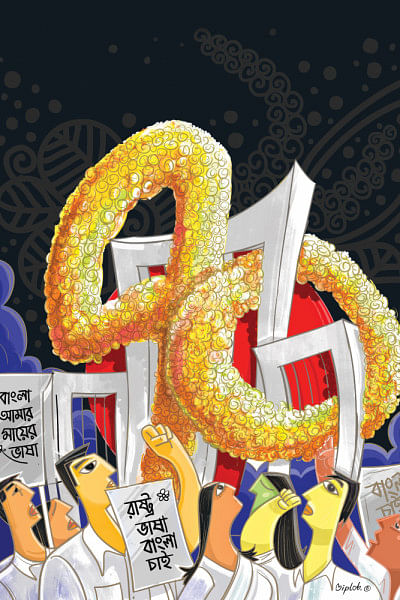Editor's Note

Seventy years ago, on this day, an act of bravery and defiance against the oppressive state machinery of Pakistan paved the way for what later cemented the Bengali identity before the world. The supreme sacrifice of the young men for their right to express themselves in their mother tongue became a precursor for subsequent struggles for economic, cultural and political freedoms for our people, which culminated in the Liberation War of 1971.
The Language Movement was not limited to the events of February 1952. Immediately after the partition, the national aspiration of the Bengalis of East Pakistan found its expression in the language question. It was more than recognition of our mother tongue as a state language, it was a demand for equality, dignity and democratic rights. In this special issue, we focus on this long history of the language movement and its historical significance. We also analyse the present status of the Bangla language in Bangladesh and West Bengal, two key Bangla-speaking regions in the world.
Seven decades later, as we celebrate our 50th year as an independent nation, we ought to look inwards and ask ourselves, to what extent have we been able to internalise the anti-colonial spirit of Amar Ekushey? For a nation that forged its identity through language, it is ironic that we now seem lost as to how to afford our mother tongue the importance it deserves in official matters, education policies and everyday lives, with indiscriminate proliferation of English, Hindi and Arabic in different spheres. As we confront an increasingly globalised world and the challenges brought about by the Fourth Industrial Revolution, it is more imperative than ever to resolve this crisis and uphold the dreams inherent in the struggle of 1952. We need to realise that being comfortable in our own skins and identities does not mean we hold ourselves back from participating and competing in the global arena—rather, it gives us the confidence we need to lead the way.
May the spirit of Ekushey guide us towards an egalitarian, anti-hegemonic, inclusive and democratic future.

 For all latest news, follow The Daily Star's Google News channel.
For all latest news, follow The Daily Star's Google News channel. 



Comments